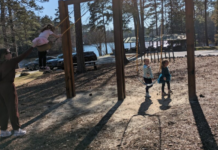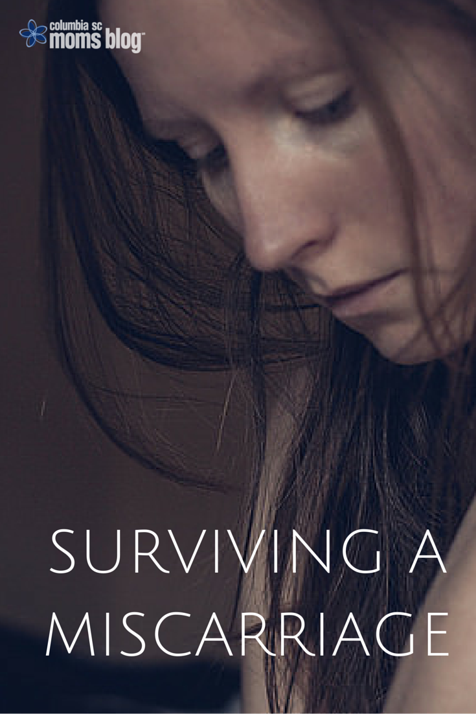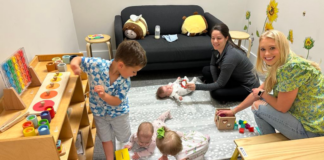You wouldn’t guess it from looking at me. I drive from place to place in our SUV with two car seats and two children in those seats. Our family of four fits very nicely in a fast food booth and the ticket deals for the State Fair. We have a happy and statistically “normal” family. You wouldn’t just look at me and label me a survivor.
You might get an idea of our other life, though, if you visited our home, where there are scrapbooks for more children than live in our home, more Christmas stockings than members of our family, and dates marked on the calendar for babies who aren’t with us.
You will see glimpses of the children we lost. There are five sweet souls who we will meet in Heaven, who left us during pregnancy. Five miscarriages in the past six years. The first was just over six years ago, the most recent was three months ago. My earliest was four weeks (what is often called a “chemical pregnancy” because it does not progress to a point where it can be seen on an ultrasound) and my latest was our daughter Naomi at nearly 19 weeks. (Yes, a baby lost at nineteen weeks is still considered a miscarriage, with twenty weeks being the cutoff between that and a stillbirth.)
Those losses were hard, no way around it. And in the midst of my first ones, especially, I often wondered how anyone survived this kind of heartbreak.
And yet, I did.

Ways to Survive After a Miscarriage
In the past six years, I have learned a lot about loss, both through my own experiences and through the experiences of others who I have met through our Naomi’s Circle outreach. One of the biggest lessons is that everyone grieves and heals differently. There is no rule book for loss, especially miscarriage, which is often overlooked as a real loss. But there are some things that seem to be helpful to a large number of parents, and I want to share them here. For anyone who is walking this road now and wondering, “How will I survive?”, here are some things that may help.
- Recognize what, and who, was lost. Not a pregnancy. Not a product of conception. A baby. Your baby. Your child. Your son or daughter. Memories that won’t be made. Future birthday parties and report cards and trips to the principal’s office. Graduations and weddings and grandchildren. A future you thought would be yours that isn’t. It is not just the baby who was, but the child and the adult who won’t be.
- Give yourself permission to grieve. It is normal, and healthy, to mourn and grieve and cry and miss this unique soul. It doesn’t matter how many living children you have. It doesn’t matter how many times you have walked this road. It doesn’t matter how early your loss was. You have lost a lot (see #1) and it is okay to be sad, even if it lasts a while.
- Consider how to say good-bye. Years ago, parents didn’t get to say good-bye to a stillborn baby. Sometimes they didn’t even get to see them, because of the prevailing notion that it would be better to forget about it and move on. Today, we know how much comfort and healing can be found in the ritual of a funeral or memorial service, which is what we did for our daughter Naomi. If a public memorial service doesn’t feel right, you can have a private one, or a special family picnic and balloon release. You can plant a memorial garden for your little one. You can ask that a single yellow or white rose be placed on the altar at your church, in memory of the baby you will meet in Heaven. There are many ways to say good-bye. Find the one that works for you.
- Give your baby a name. Along with planning a funeral, this is something that funeral director Caleb Wilde suggests is one of the most healing things a parent can do. That does not mean that you have to. Many parents don’t feel a need to do this, especially for an earlier loss. But many others find great comfort and healing in it, and it is never too late.
- Learn about loss. You are going to be on this journey for a while, so it makes sense to learn about it. There are some incredible books out there, as well as websites and online forums. All of those are ways to “meet” other parents and hear their stories, to find out that what you are experiencing is, in fact, very normal. It is not pleasant, but it is normal.
- Express your grief. If you are a writer, write about it in a journal, or in a blog. If you are a musician, sing about it or play something on your instrument about it. If you are an artist, paint it. Talk to other parents about it. Share it with a grief counselor. Talk with your spouse. Whatever you do, don’t bottle it up and ignore it.
- Lean hard into God. If you are a person of faith, don’t walk away from God. You may feel confused, or angry, or abandoned, or abused by the One who you thought would keep you safe. Tell Him. He can handle it. And He will carry you through it.
- Find a support system. Yes, you can get through loss by yourself, but it is a lot easier with other people by your side. There are some incredible forums and social media groups online. I have been a part of the Hannah’s Prayer forums for six years, and the women there have talked me down from sky-high levels of anxiety and grief, they have held my hand (from a distance) on my worst days, and they modeled for me how to walk the road of loss without losing myself or my faith. Some of the best friends I have are women I may never meet in person. Beyond the online support, though, look for it in real life, whether in your circle of friends or in a support group. If you are in the Columbia area, look at the support group list on the Naomi’s Circle website. If you are somewhere else, Share Pregnancy and Infant Loss Support has a list of support groups around the country, or you can contact your local hospital to see if there is a group that meets there.
- Buy or make a piece of memorial jewelry. I have bracelets with my babies’ names on them, a ring with some of their names, and a necklace with beads for each one. When I wear them, I feel like I am carrying them with me in some small way.
- Prepare for hard days. There will be some. Your due date, the anniversary of your loss, Mother’s Day, certain religious holidays, your birthday. Especially the first year, but beyond that as well. Preparing your heart for them, or planning something special to do on those dates, helps. (And often, the anticipation is actually worse than the day itself.)
- Give yourself time. No, time does not heal all wounds, but it does help. For many parents who experience a loss in pregnancy, it may be 18 to 24 months before you settle into your “new normal.” It may be less, it may be more. It is not a loss that you “get over” in a matter of weeks or even months. That doesn’t mean it will always hurt this bad, but it means you can, and should, give yourself grace when you still find yourself having bad days down the road.
- Realize that others are grieving, too. Your husband. Your living children. Your parents. Your friends. It is amazing how many lives one small soul touches. Even if some of those don’t miss your baby the same way you do, they ache for you, and sometimes that ache makes them say things that hurt, because they are trying to help. Give them grace, too.
- Embrace life. When you are in the thick of the rawest days of loss, laughing and smiling seem impossible, but you will get there. For some, embracing life means picking up a hobby they enjoyed “before”. For others, it means going back to work. For some it means trying to conceive again. For some, it means entering back into daily life, slowly and cautiously. Whatever it looks like to you, don’t avoid it. Embrace the life you were born to live, and while you do, you will begin to find clues to the purpose in your baby’s life, too.
Especially if you live in the Columbia area, but even if you don’t, please feel free to contact Naomi’s Circle for information on resources available to parents dealing with pregnancy loss. You may also find some helpful articles on my personal blog, This Side of Heaven.
















As always, this is beautiful advice. xoxo